Filter by
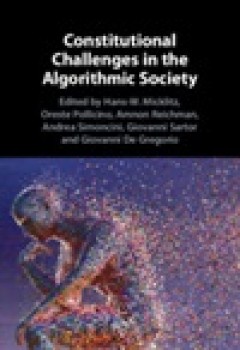
Constitutional challenges in the algorithmic society
Technologies have always led to turning points for social development. In the past, different technologies have opened the doors towards new phase of growth and change while influencing social values and principles. Algorithmic technologies fit within this framework. Although these technologies have positive effects for the entire society by increasing the capacity of individuals to exercise ri…
- Edition
- -
- ISBN/ISSN
- 9781108843126
- Collation
- x, 330 pages ; 24 cm
- Series Title
- -
- Call Number
- 342 MIC c

Studies in global animal law
This open access book contains 13 contributions on global animal law, preceded by an introduction which explains key concepts and methods. Global Animal Law refers to the sum of legal rules and principles (both state-made and non-state-made) governing the interaction between humans and other animals, on a domestic, local, regional, and international level. Global animal law is the response to t…
- Edition
- 1
- ISBN/ISSN
- 9783662607565
- Collation
- -
- Series Title
- -
- Call Number
- 346.046954 ANN s
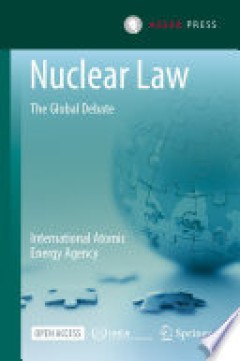
Nuclear law : the global debate
This open access book traces the journey of nuclear law: its origins, how it has developed, where it is now, and where it is headed. As a discipline, this highly specialized body of law makes it possible for us to benefit from the life-saving applications of nuclear science and technology, including diagnosing cancer as well as avoiding and mitigating the effects of climate change. This book se…
- Edition
- -
- ISBN/ISSN
- 9789462654952
- Collation
- viii + 333 p
- Series Title
- -
- Call Number
- 343.0925 NUC n
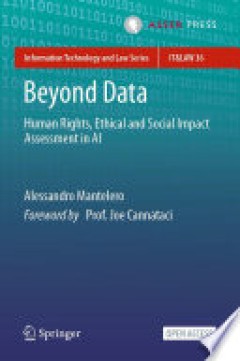
Beyond data : human rights, ethical and social impact assessment in AI
This open access book focuses on the impact of Artificial Intelligence (AI) on individuals and society from a legal perspective, providing a comprehensive risk-based methodological framework to address it. Building on the limitations of data protection in dealing with the challenges of AI, the author proposes an integrated approach to risk assessment that focuses on human rights and encompasses…
- Edition
- Ed. 1
- ISBN/ISSN
- 9789462655317
- Collation
- 8 p. : XXIII, 200
- Series Title
- Information Technology and Law Series
- Call Number
- 343.0999 MAN b

Carceral Logics : Human Incarceration and Animal Captivity
Carceral logics permeate our thinking about humans and nonhumans. We imagine that greater punishment will reduce crime and make society safer. We hope that more convictions and policing for animal crimes will keep animals safe and elevate their social status. The dominant approach to human-animal relations is governed by an unjust imbalance of power that subordinates or ignores the interest non…
- Edition
- -
- ISBN/ISSN
- 9781108919210
- Collation
- xiii, 450 p ; ill
- Series Title
- -
- Call Number
- 344.049 CAR L
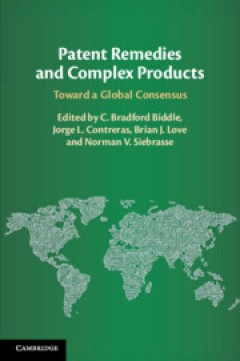
Patent Remedies and Complex Products : Toward a Global Consensus
Through a collaboration among twenty legal scholars from eleven countries in North America, Europe and Asia, Patent Remedies and Complex Products presents an international consensus on the use of patent remedies for complex products such as smartphones, computer networks and the Internet of Things. It covers the application of both monetary remedies like reasonable royalties, lost profits, and …
- Edition
- -
- ISBN/ISSN
- 9781108594981
- Collation
- xxvi, 380 p : ill
- Series Title
- -
- Call Number
- 346.0486 PAT C

The Cambridge Handbook of Health Research Regulation
The first ever interdisciplinary handbook in the field, this vital resource offers wide-ranging analysis of health research regulation. The chapters confront gaps between documented law and research in practice, and draw on legal, ethical and social theories about what counts as robust research regulation to make recommendations for future directions. The Handbook provides an account and analys…
- Edition
- -
- ISBN/ISSN
- 9781108620024
- Collation
- xix, 444 p ; ill
- Series Title
- -
- Call Number
- 344.04196 CAM G
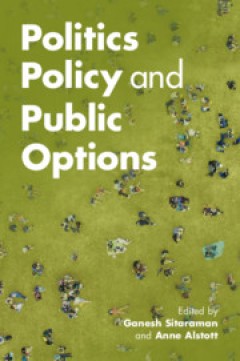
Politics, Policy, and Public Options
A public option is a government-provided social good that exists alongside a similar privately provided good. While the public option is typically identified with health care policy, public options have been a longstanding feature of American life in a variety of sectors, ranging from libraries to swimming pools. Public schools, for example, coexist alongside private schools. However, there is …
- Edition
- -
- ISBN/ISSN
- 9781108767552
- Collation
- ix, 186 p ; ill
- Series Title
- -
- Call Number
- 344.730316 POL G

Law as Religion, Religion as Law
The conventional approach to law and religion assumes that these are competing domains, which raises questions about the freedom of, and from, religion; alternate commitments of religion and human rights; and respective jurisdictions of civil and religious courts. This volume moves beyond this competitive paradigm to consider law and religion as overlapping and interrelated frameworks that stru…
- Edition
- -
- ISBN/ISSN
- 9781108760997
- Collation
- vii, 404 p ; ill
- Series Title
- -
- Call Number
- 208.4 LAW
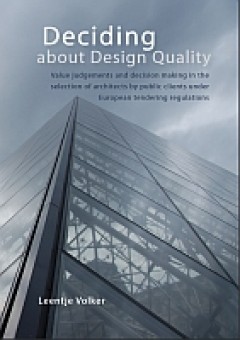
Deciding about design quality : value judgements and decision making in the s…
In the past few years the image of tender procedures in which Dutch public clients selected an architect has been dominated by distressing newspaper headlines. Architects fear that the current tender culture will harm the quality of our built environment due to a potential lack of diversity, creativity and innovation in architectural design. Clients often allow legal requirements to overrule th…
- Edition
- edision 12
- ISBN/ISSN
- 9789088900532
- Collation
- xi. ;342 p. :ill.
- Series Title
- -
- Call Number
- 343.49207872. DEC l
 Computer Science, Information & General Works
Computer Science, Information & General Works  Philosophy & Psychology
Philosophy & Psychology  Religion
Religion  Social Sciences
Social Sciences  Language
Language  Pure Science
Pure Science  Applied Sciences
Applied Sciences  Art & Recreation
Art & Recreation  Literature
Literature  History & Geography
History & Geography